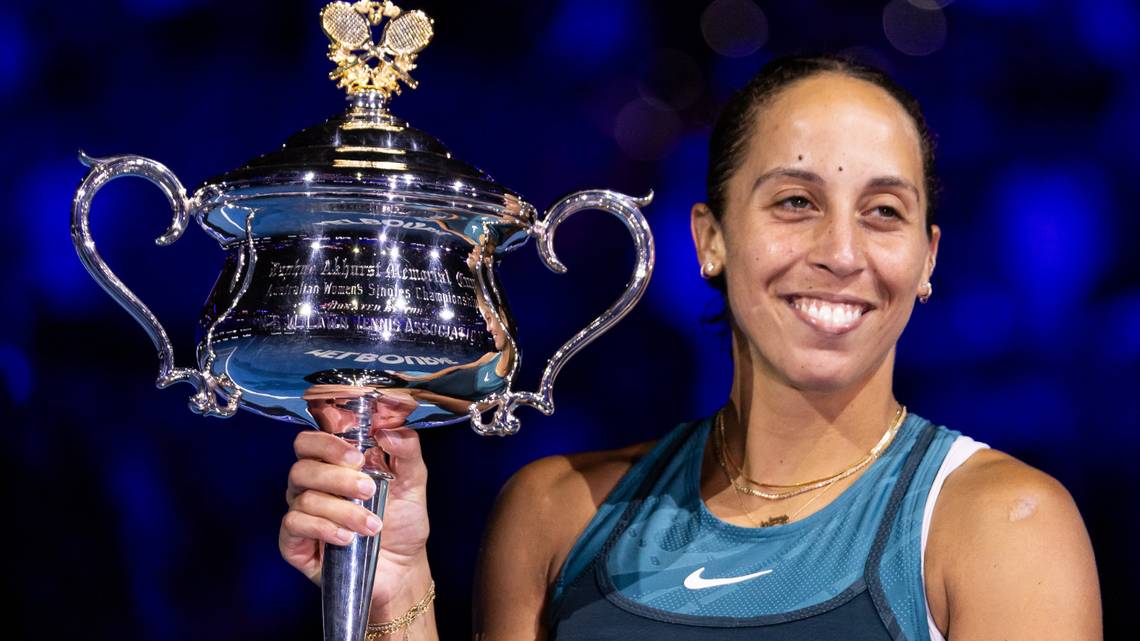Tennis
Australian Open champ Madison Keys reflects on early days in Boca Raton, Key Biscayne

Source
miamiherald.com
All over South Florida this week, surely there are tennis fans who recall seeing Madison Keys’ power, promise, and smile long before she won the Australian Open at age 29 on Saturday, becoming the oldest American in the Open era to win her first Grand Slam title.
Maybe they saw her as an 8-year-old camper at the Evert Tennis Academy in Boca Raton, on summer break from Rock Island, Illinois, with her family.
Or maybe they encountered her a few years later as a full-time student at the academy, getting tips from legend Chris Evert and her brother, John, who was so impressed with Keys as a camper that he encouraged Keys’ parents, both attorneys, to relocate from Illinois to fully immerse Madison in the sport.
Perhaps they remember her from Junior Orange Bowl tournaments at Salvadore Park and Biltmore Tennis Center in Coral Gables, or from the Crandon Park Tennis Center in Key Biscayne, where 5-foot-10 Keys dazzled spectators with her 114 mph serve as a 14-year-old in the Orange Bowl Under-18s division.
In an interview with the Miami Herald on Tuesday, Keys reflected on the early stages of her career in South Florida and how they shaped her into the Australian Open champion and No. 7 ranked player in the world.
“I have very fond memories of coming down for one-month vacations in Boca when I was 8, 9 and 10, and two of the four weeks I would do the camp at Evert Academy,” Keys said. “When I was 10, John [Evert] pulled my parents aside and said, `Hey, if you guys want to really go for this, then I think she should come as a full-timer.”
Keys’ parents, Rick, a former college basketball player, and Christine, asked their eldest daughter what she wanted, and she told them she wanted to move to Boca Raton and one day be a professional tennis player. They obliged.
Keys’ mother took a leave from their family law firm the following year and moved to Boca with Madison and her younger sisters Montana and Hunter.
“I always laugh thinking back, the fact that my parents just kind of let me dictate my life at 10 years old,” Keys said. “They fully supported me. So, we packed up and moved to Florida.”
She stayed at the Evert Academy until age 16 and said her coaches there taught her foundational skills she applied the rest of her career.
“They were amazing,” Keys said. “They helped me incredibly much. They changed a bunch of my techniques. They changed my grip. I learned how to hit a kick serve from one of the coaches there. And, I had such a great time because I wasn’t going to regular school, I was being home-schooled, so it was great being able to be around those kids and have as normal a life as you can while you’re living at a tennis academy.”
She remains close with some of her friends from those days.
Keys also has vivid memories of competing in the Jr. Orange Bowl and Orange Bowl tournaments. She remembers losing as an 11-year-old on a corner court and then winning the 12-under title the next year. She recalls making it to the Under-16s final at age 13 and then numerous big matches in the 18s at Crandon Park.
“I always really loved playing in Key Biscayne and then it was really fun for me to be able to go from Orange Bowl to playing in the Miami Open on the same courts,” she said.
Keys made steady progress over the next few years and reached the Australian Open semifinals in 2015, a month shy of her 20th birthday. Chris Evert was not surprised.
“I think everybody that saw her at that point [as a younger teenager] and thought, ‘Oh, my gosh, there’s so much raw power that if she could just control it and harness it, she’s going to be a great player,’” said Evert.
At the time, ESPN commentator Patrick McEnroe said of Keys: “I certainly think within the next 24 months, two and a half to three years, absolutely, Madison can win a major.”
It wound up taking 10 years, and she did it by dominating the entire tournament.
Keys, who entered the tournament ranked No. 19, knocked off four top-10 seeds, including No. 2 seed Iga Swiatek and top seed and two-time defending champion Aryna Sabalenka. Keys was the first woman since Serena Williams in 2005 to beat No. 1 and No. 2 at the Australian Open and the first to do it at any major tournament since Svetlana Kuznetsova at the 2009 French Open.
Her only previous final in a Slam was a forgettable one. She lost 6-3, 6-0 to fellow American Sloane Stephens at the 2017 U.S. Open.
The biggest reason for her improbable Australian Open run last week, she said, was a new mental approach.
“I finally unburdened myself from the pressure of wanting to win a Slam, finally got to the point where I could actually be a lot more present on the court, playing freely, problem solve and work through nerves,” said Keys, who now lives in the Orlando area with husband/coach Bjorn Fratangelo, whom she married in November.
She explained that she had a tendency to get nervous at critical moments during matches but learned to relax.
“A lot of times in the past, nerves were bad, and there was a panic moment like `Oh, God, I’m nervous; this is going to be bad,’’’ Keys said. “But I’m in a good place now. Winning or not winning a Slam doesn’t define me anymore. It’s amazing to be in a position where it’s just one another accomplishment instead of defining who I am as a person.”